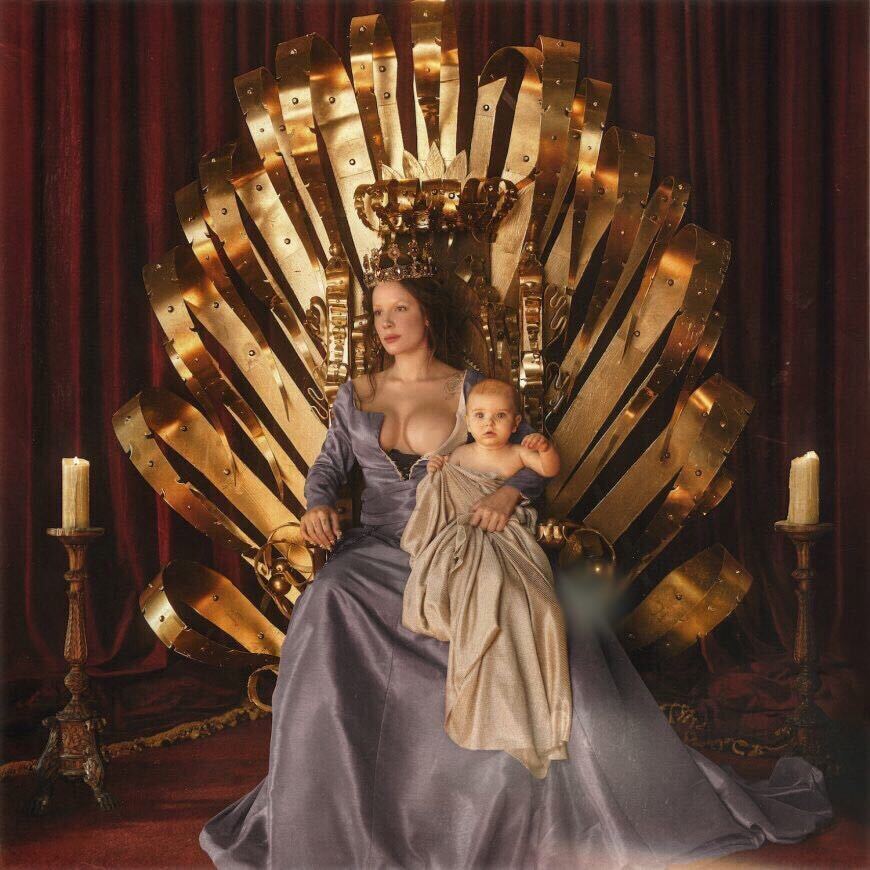In 2019, Halsey released the fiery “Nightmare,” an urgent, industrial anthem that aptly captured the universal “female rage” amplified by the patriarchal doom of the Trump era. The song, a stark departure from her pop-centric releases in the past, was noticeably left off of their third album Manic. The track, however, was never written off by Halsey; instead, the defiant, standalone single laid the foundation for If I Can’t Have Love I Want Power, the singer’s new concept album that tackles “the joys and horrors of pregnancy and childbirth.”
The unwavering hope of parenthood loomed large on Halsey’s last record Manic, as she marked their uphill battle conceiving with a love song to their future child. “When you decide it’s your time to arrive, I’ve loved you for all of my life,” they sang with a sweet lilt. On IICHLIWP, that dream is realized — but for Halsey, like so many pregnant people, the joy of pregnancy and parenthood isn’t linear. For them, it’s earmarked by a smattering of grief, rage, mental health struggles, self-doubt, and desire. IICHLIWP is bursting with as much elation as it is emotional turmoil for what the responsibility of parenthood can mean — and what happens when it outweighs the dream of pop stardom. Over a blistering drum loop that evokes the nostalgia of Smashing Pumpkins’ “1979,” Halsey grapples with a conventional future that leaves their misfit past behind on “You Asked For This”: “You wished upon a falling star/And then left behind the avant-garde/For lemonade in crystal glasses/Picket fences, file taxes.” But ultimately they find power in realizing it’s okay to embrace their growth. “I want everything I asked for,” she warbles over guitar fuzz.
Being a parent is something Halsey has longed for more than being a pop star. After a miscarriage in 2015 and a public battle with endometriosis, they revealed they were pregnant last November. The moment, celebrated by fans, was hard-won, and IICHLIWP explores the paradoxical emotions — the pleasure and pain — of impending parenthood. And what persists is their internal battle to find some semblance of calm despite the chaos of their inner monologue. Enlisting Nine Inch Nails production masterminds Trent Reznor and Atticus Ross and a star-studded set of backing artists like Lindsey Buckingham, Dave Grohl and Dave Sitek, IICHLIWP shows Halsey leveling up.
Still, IICHLIWP will satiate listeners who have yearned for a “rocksy” or “punksy” album and perhaps expand her already wide fanbase. Despite being a pop innovator, the genre-defying singer has yet to be properly recognized by the Grammys. Working with Nine Inch Nails may help to deliver the cache of being a catalog artist that Halsey has yet to experience — the reason for which remains nebulous. But any accolades Halsey may earn for her latest work won’t be because of the men she’s working with, it will be because she’s a maverick, an agent of chaos who was perhaps misunderstood.
On Halsey’s 13-track oeuvre, they present a masterclass in songwriting and production overflowing with a seductive industrial canvas as well as noise-rock, punk choruses, and fuzzed-out guitars. In many ways, it recalls Reznor and Ross’s avant-garde industrialist side project How to Destroy Angels all the while Halsey oscillates between the softness and toughness that comes with bringing a child into a patriarchal world. Opening with an angsty Fiona Apple-like chant, Halsey skewers the idea that men be absolved of their crimes. “And they said that boys were boys/ But they were wrong,” she protests on “The Tradition.” That rage is a throughline of the record fueled by primal screams that recall Karen O on the punk rush of “Easier Than Lying,” and with “The Lighthouse,” a bluesy, brooding callback to “Nightmare,” that describes the aftermath of Halsey showing a man their teeth. But Halsey’s inner torment is equally as distressing. The hip-hop-tinged “Lilith” is a self-doubting stream of consciousness that magnifies their spiraling thoughts during pregnancy: “I am disgusting/ I’ve been corrupted/ And by now I don’t need no help to be destructive.” On the hymnal “Bells in Santa Fe” she warns, “Don’t wait for me, wait ah/It’s not a happy ending.” “Whispers” details the horror-filled cyclical thoughts that haunt her: “Sabotage the things you love the most /Camouflage so you can feed the lie that you’re composed.” Still, in the midst of their chaos, Halsey attempts to embrace her own sexuality. “Lemme show you how to touch my trigger,” Halsey teases on “Girl Is a Gun” over spiraling synths, and the anxious punk track “Honey” recalls the allure of a fleeting romance over a pop-punk-leaning melody.
In between raucous and pulsating synths, IICHLIWP offers a few quieter moments which Halsey has always carved space for on their records — glimmers of love grown from suffering. “Darling” is a bittersweet, stripped-down acoustic lullaby to their child. “I’ll kidnap all the stars and I will keep them in your eyes,” she swears. Despite the album’s overt moodiness, Halsey concludes the record with a sweet, and slightly morbid, declaration of everlasting love with “Ya’aburnee:” an Arabic phrase that expresses the hope that someone will die before another individual because of how challenging it would be to live without them. “If we don’t live forever/maybe one day we’ll trade places/ Darling you will bury me/ Before I bury you,” they sing over a single throbbing guitar note.
Noticeably absent on Halsey’s fourth studio album are pure pop songs and obvious radio hits. But IICHLIWP is a showcase of Halsey’s work as a musical chameleon and expert in unpredictability. Its effectiveness isn’t at all surprising if you’ve followed her career: Halsey has long-embraced the power of reinvention since the release of their debut EP Room 93 in 2014. While 2015’s Badlands and 2017’s Hopeless Fountain Kingdom were more pop- and R&B-leaning, last year’s Manic tackled everything from country and hip-hop to alt-rock. But despite being genre-fluid, Halsey has consistently maintained an affinity for cinematic universes and vivid storytelling through each record. Room 93 captured the intimacy of hotel rooms through a series of vignettes, Badlands manifested Halsey’s lonely mindset in a desolate desert and Hopeless Fountain Kingdom put a dystopian twist on Shakespearean tragedy. Manic was full of audio snippets from Halsey’s favorite films like Jennifer’s Body and Eternal Sunshine of the Spotless Mind. IICHLIWP is a manifesto for parenthood with the cohesive flow of a soundtrack paired with a feature-length film.
IICHLIWP may perhaps be Halsey’s most ambitious work yet — a portrait of an artist still clouded by chaos, but slowly vying to let themself be — in love, happy, content — without fear of self-sabotage. She wanted parenthood more than pop stardom. Now they’ve got both. But Halsey is not a woman, they’re a rock God. And IICHLIWP proves she’s earned the title.





